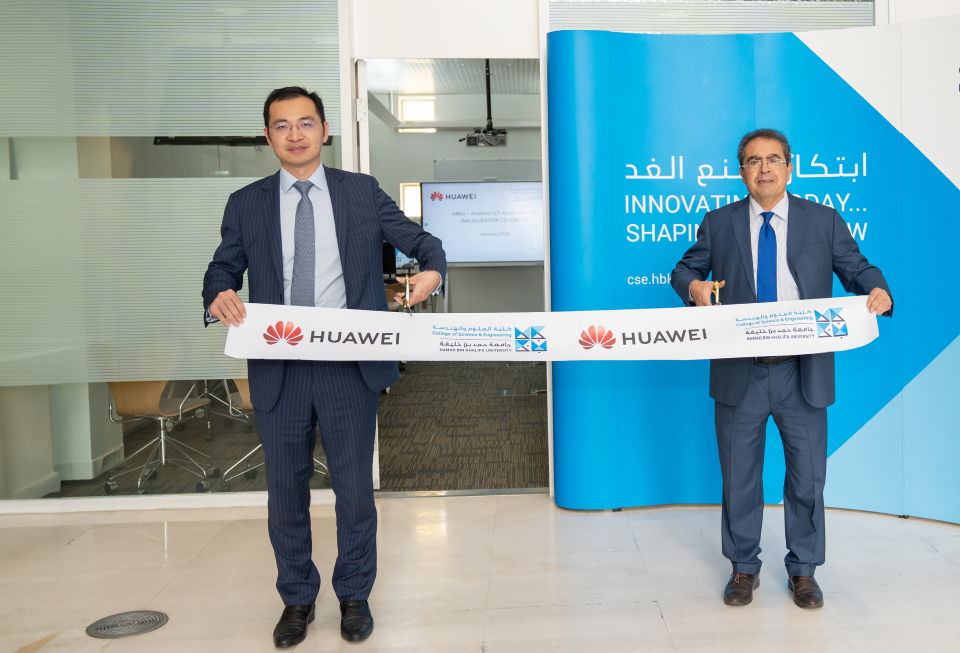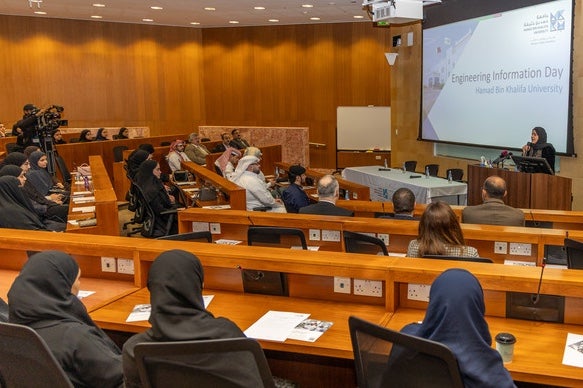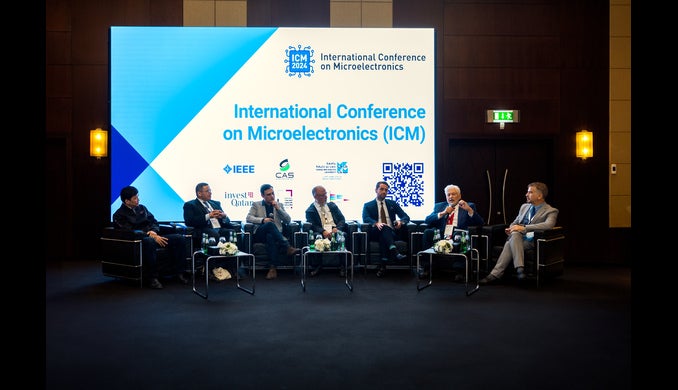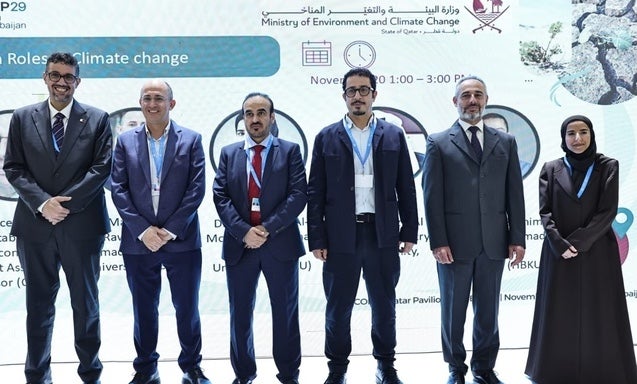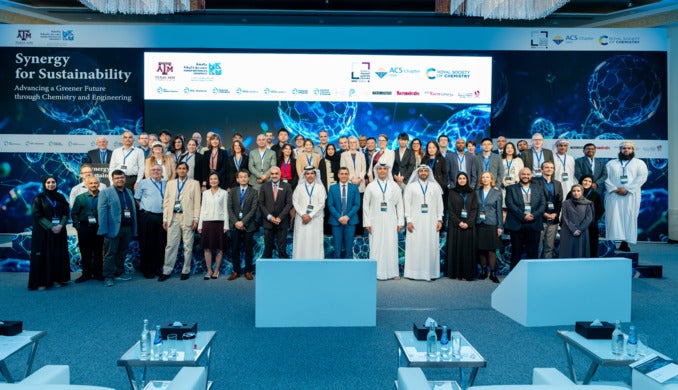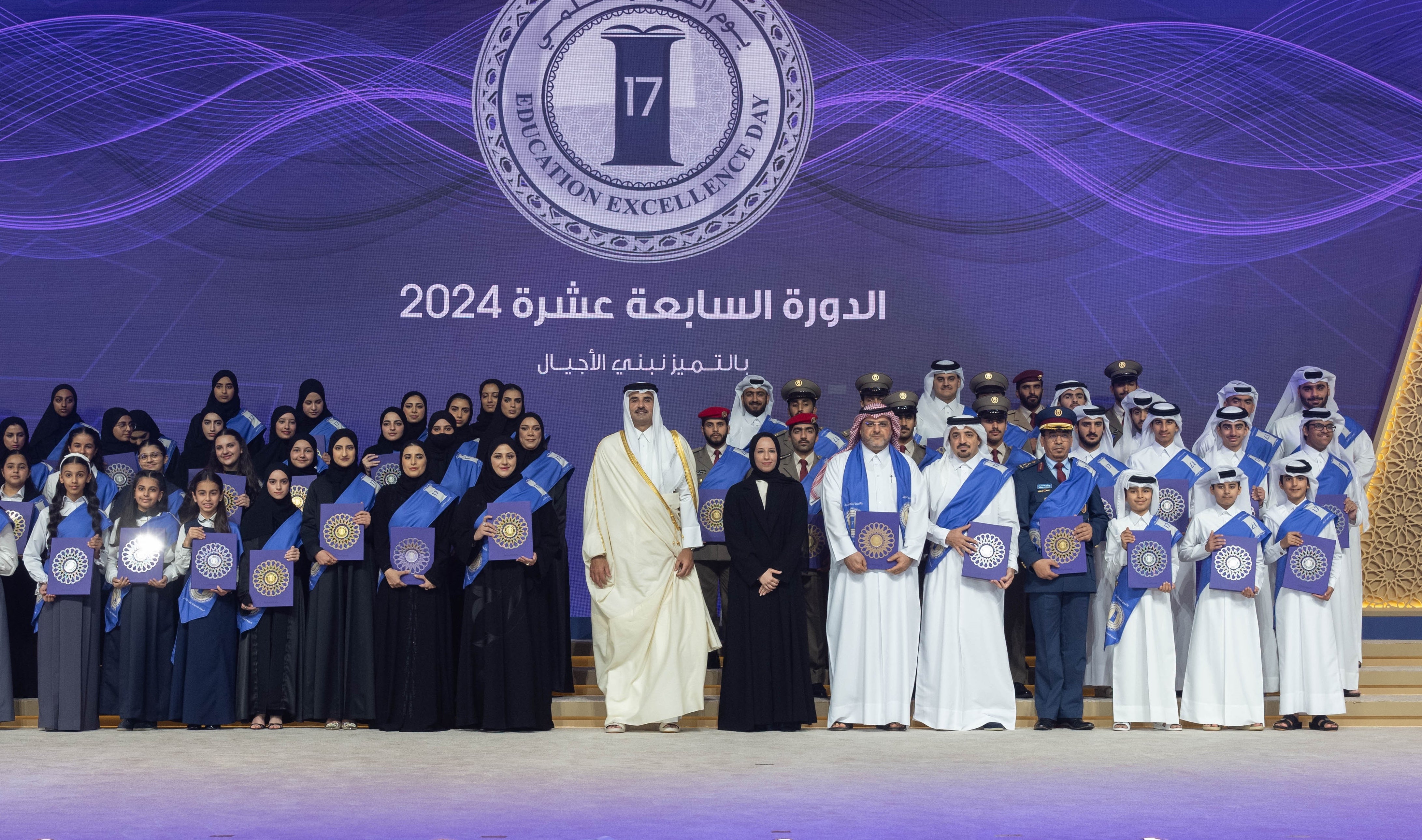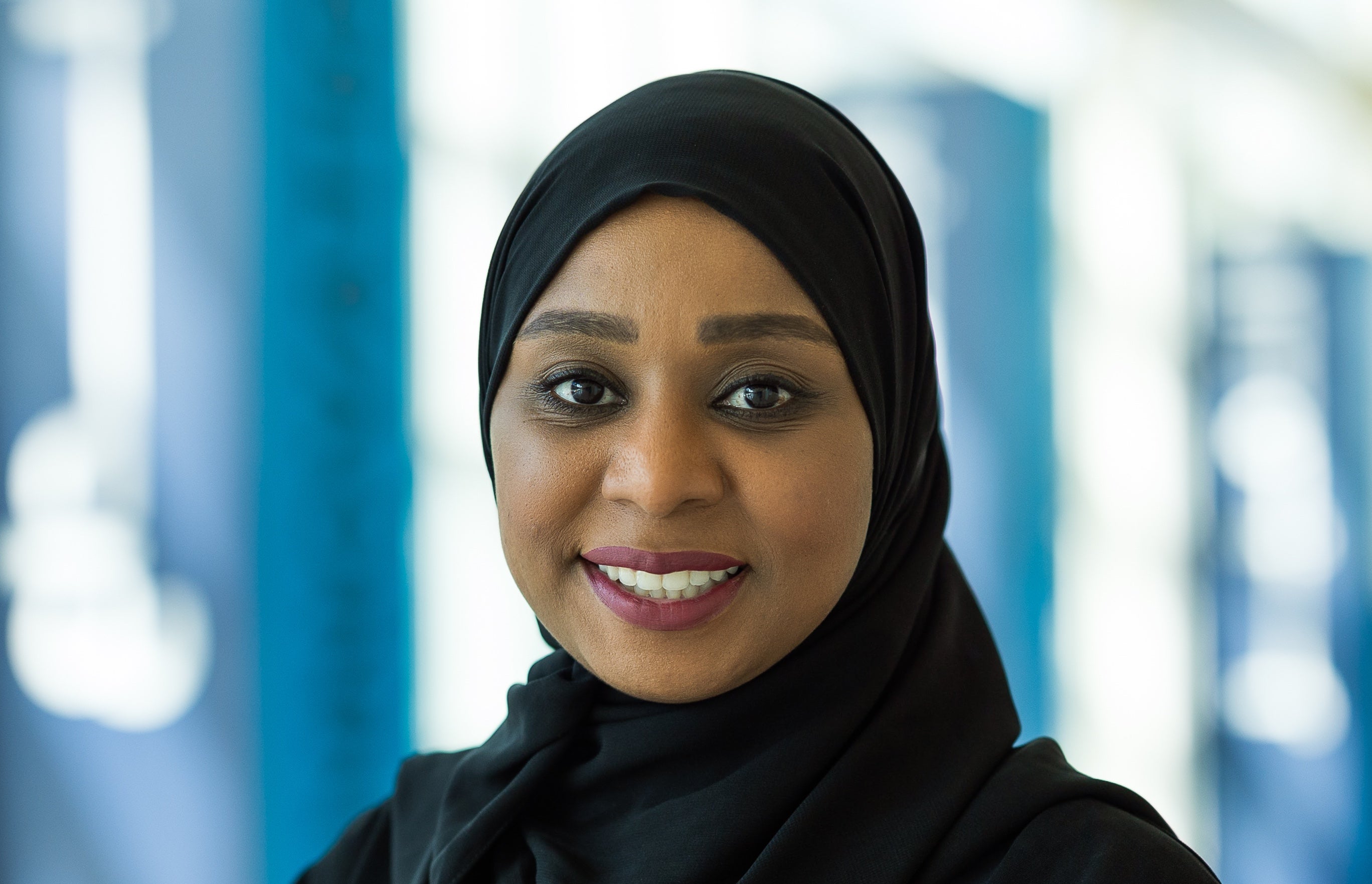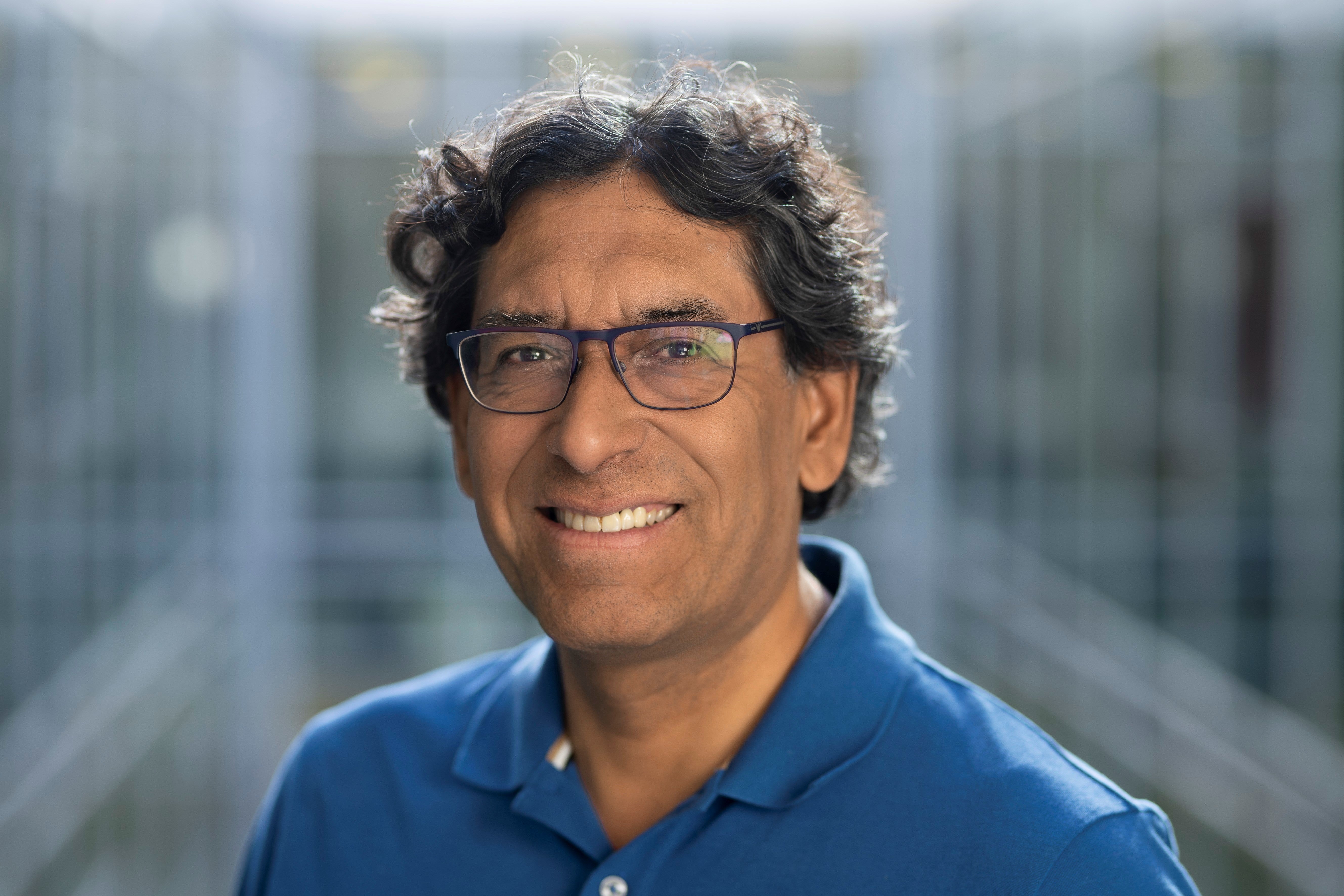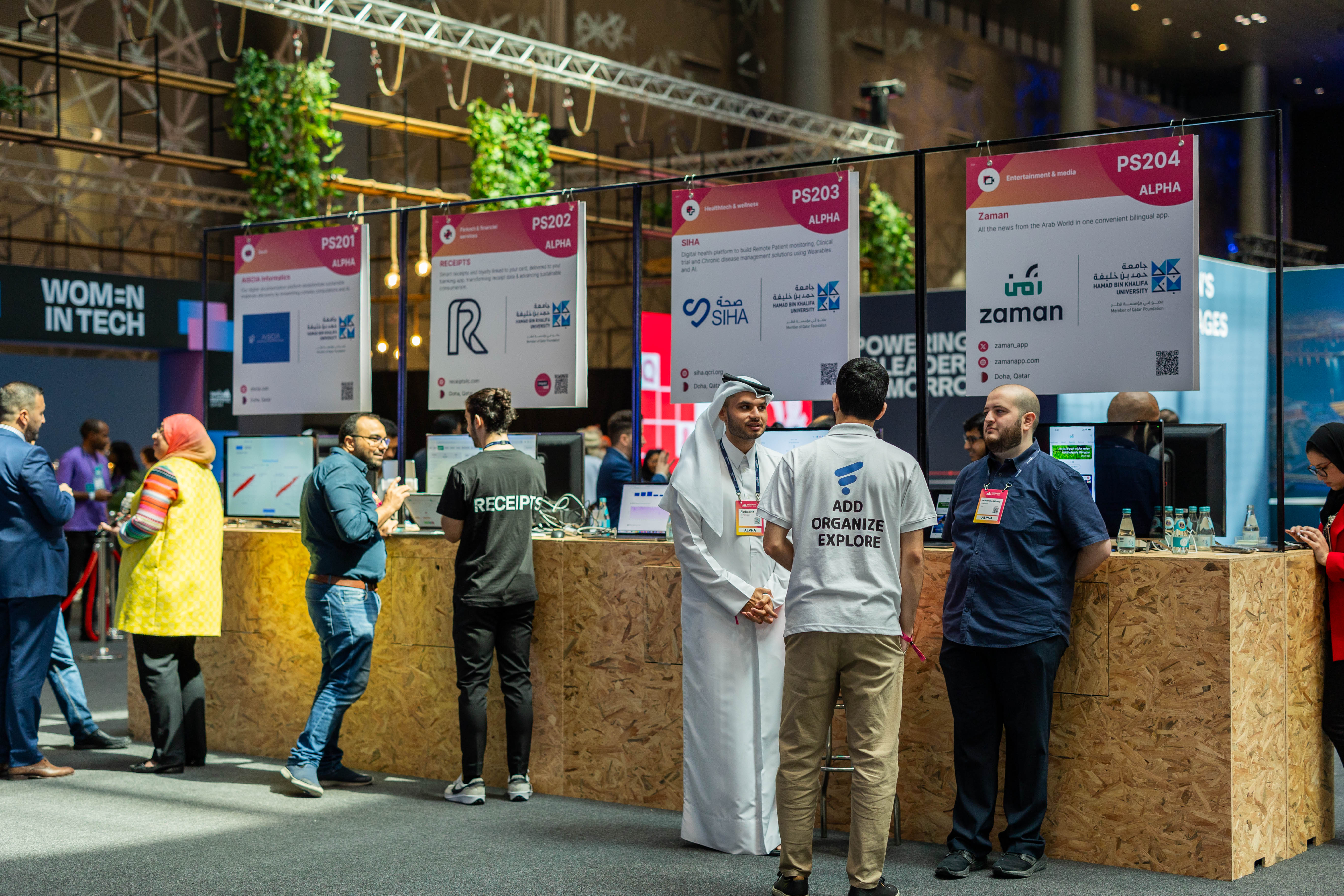
CSE and QEERI Organize Atmospheric Water Generation Seminar
An opportunity to discuss the present and future of AWG solutions and technologies
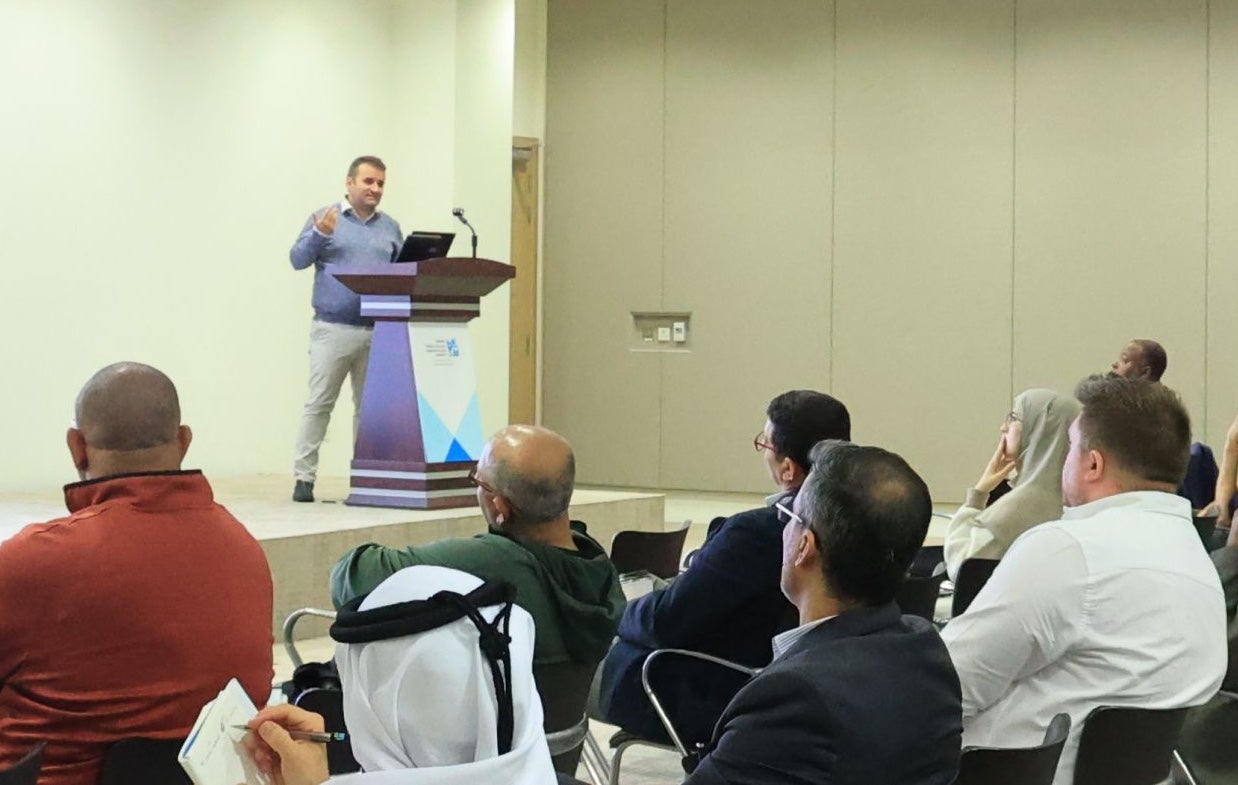
In line with its mission to provide solutions in water, energy, and environment for arid regions, the College of Science and Engineering (CSE) and Qatar Environment and Energy Research Institute (QEERI) organized a seminar to consider cutting edge technologies for harnessing water from the atmosphere.
Held January 7 at Hamad Bin Khalifa University’s (HBKU) Researchery, Atmospheric Water Generation – Perspectives on Performance and Scalability discussed current challenges and future opportunities shaping atmospheric water generation (AWG). The seminar’s guest speaker was Dr. Ludovic Dumée, Decarbonization Lead at the Research and Innovation Center on 2D Nanomaterials (RIC2D) and Assistant Professor of Chemical and Petroleum Engineering at Abu Dhabi’s Khalifa University. Dr Dumée’s presentation highlighted novel material solutions for AWG, as well as efforts to utilize selective adsorbents and natural sunlight for regeneration. Participants were also introduced to Khalifa University’s Atmospheric Water Generation (AWG) platform, and considered recent pilot tests involving innovative techniques such as direct air cooling and condensate recovery.
Speaking after Atmospheric Water Generation – Perspectives on Performance and Scalability, Dr. Peter Desmond, Assistant Professor in Sustainable Development, CSE, emphasized the importance of fostering exchange between leading research institutes within the region: “We were delighted to welcome Prof. Dumee from Khalifa University to HBKU and thank him for his excellent contribution to the first lecture of the 2024 Water Seminar Series. The purpose of the seminar series is to promote interdisciplinary collaboration between HBKU researchers and leading international academics in the field. By bringing together experts from various fields, we can tackle the multifaceted challenges of water scarcity and develop innovative solutions that are tailored to the unique environmental conditions of the Gulf region.”
Echoing Dr. Desmond's sentiments, Dr. Jenny Lawler, Senior Research Director of the Water Center at QEERI, added: “It was a privilege to host Dr Dumée for a discussion on a perennially important issue for Qatar and the wider region. Gulf countries rely on seawater and brackish water desalination to offset water scarcity, with associated high energy need and environmental impact. The region’s high humidity and temperatures offer a unique opportunity for atmospheric water generation as a non-conventional water resource. We are determined to hold further discussions on this subject as AWG technologies evolve.”
Related News
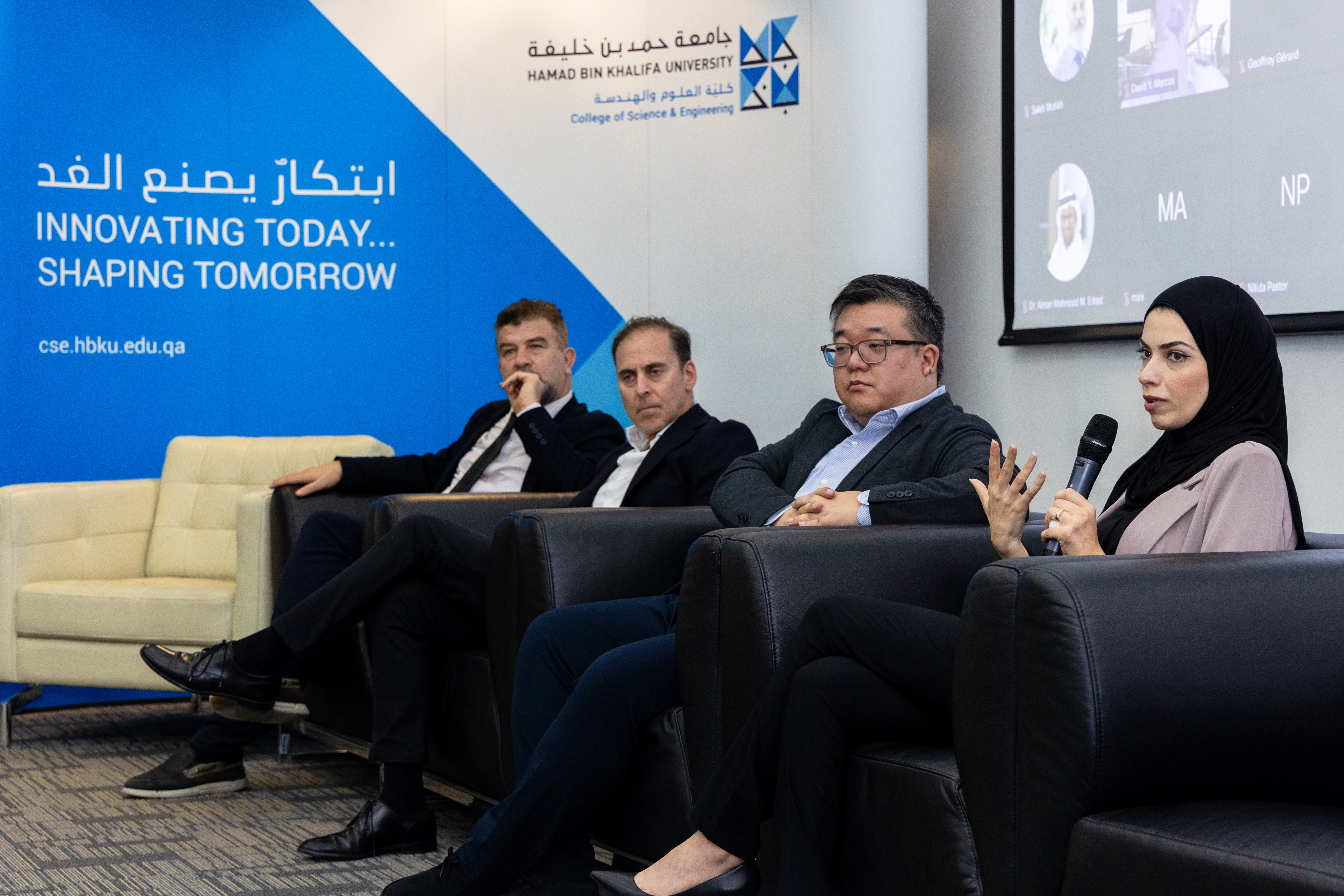
HBKU’s CSE and IE Impact Xcelerator Host Healthcare and Technology Collider Roundtable
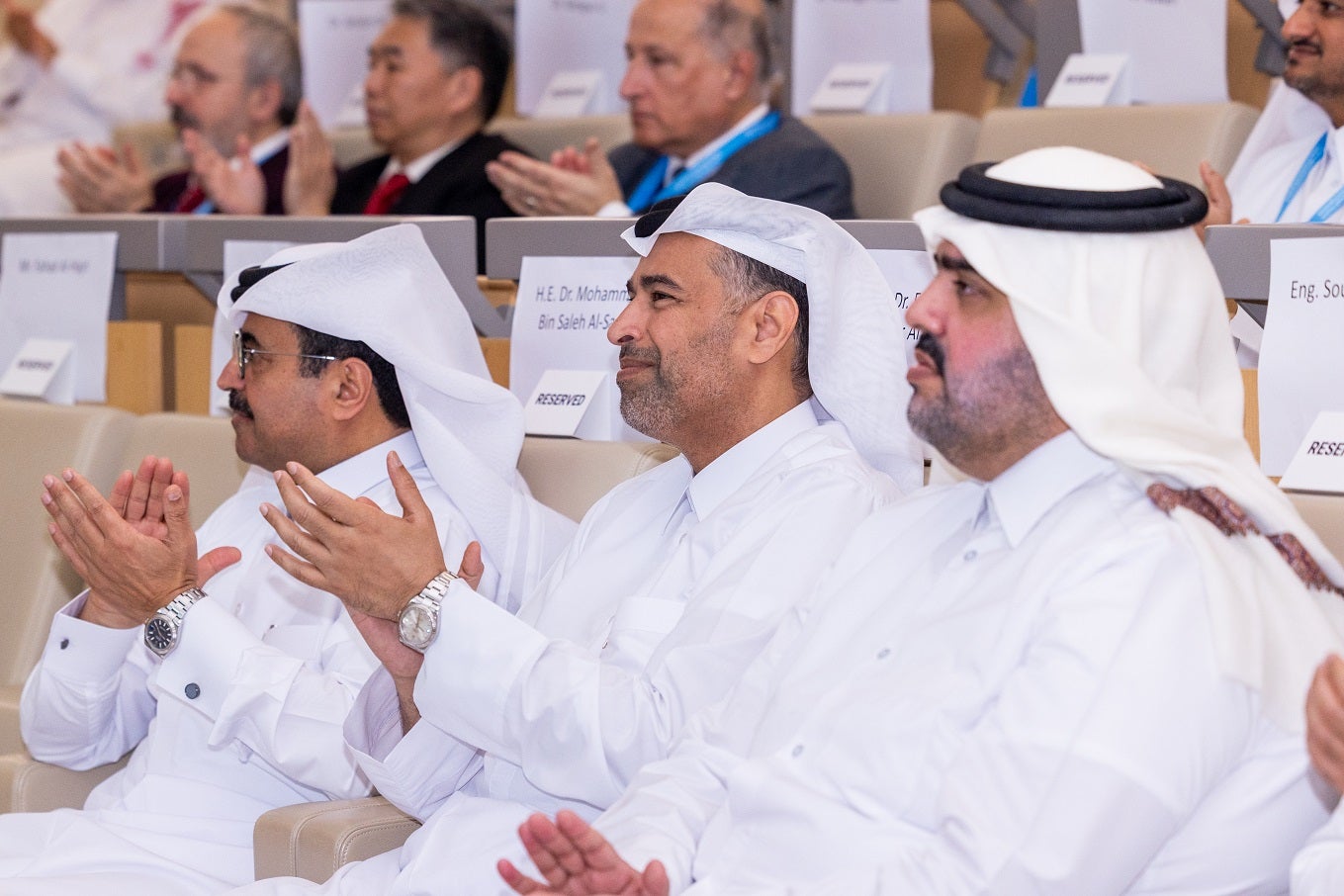
HBKU’s CSE Hosts 14th International Conference on Hydrogen Production (ICH2P-2023)
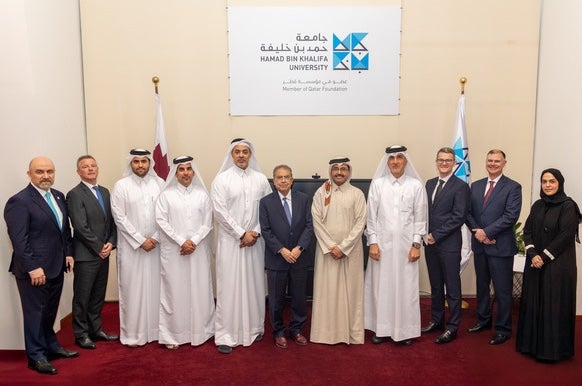
HBKU’s College of Science and Engineering Organizes First Industry and Government Advisory Board Meeting
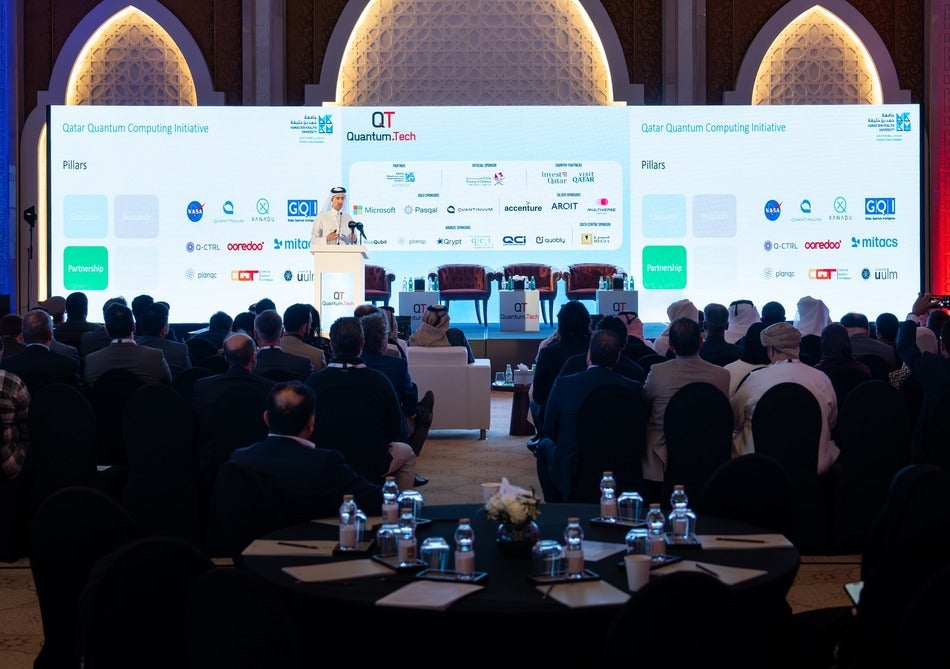
HBKU and Quantum.Tech Bring Major Quantum Event to the Middle East for the First Time
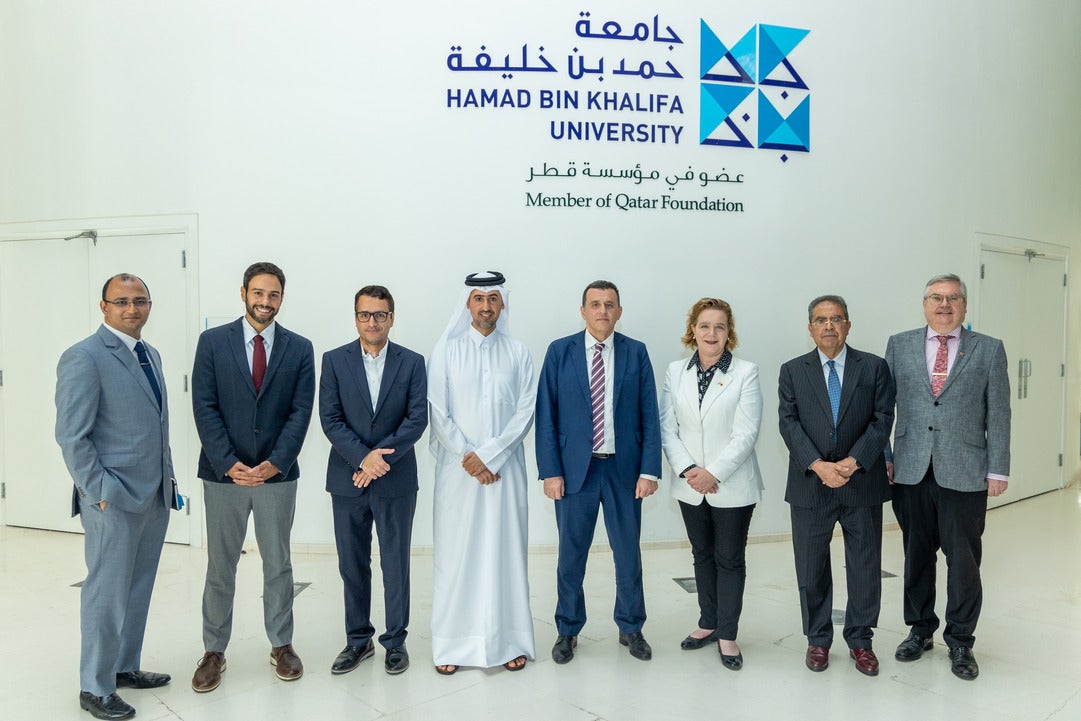
HBKU Signs Memorandum of Understanding with Canada’s Leading Innovation Organization

Hamad Bin Khalifa University and Quantinuum Partner to Advance Quantum Computing in Qatar
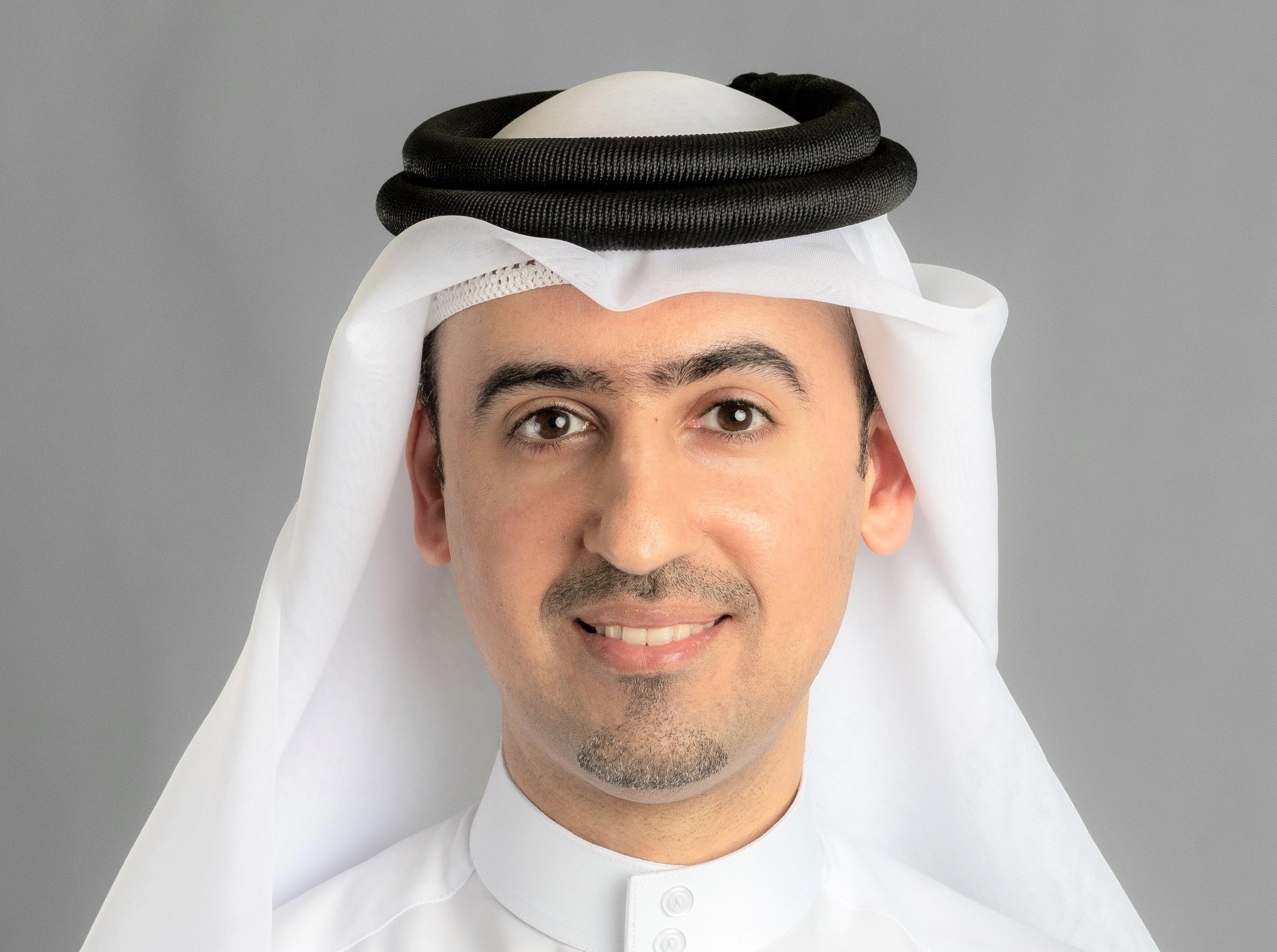
HBKU’s College of Science and Engineering Signs Memorandum of Understanding with NASA on Quantum Research and Education
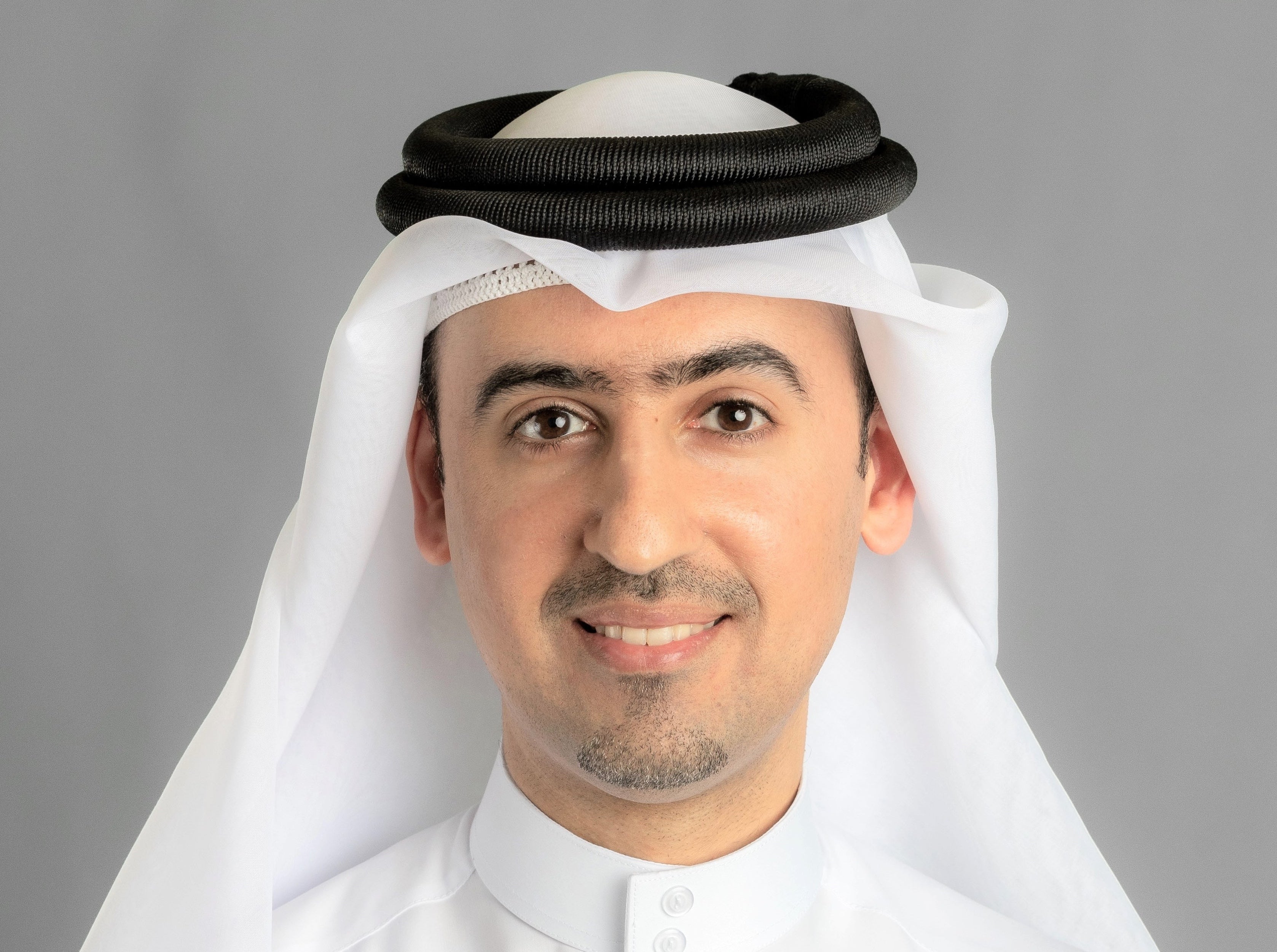
Q-CTRL and Hamad Bin Khalifa University’s College of Science and Engineering Partner to Equip the Next Generation Quantum Workforce in Qatar
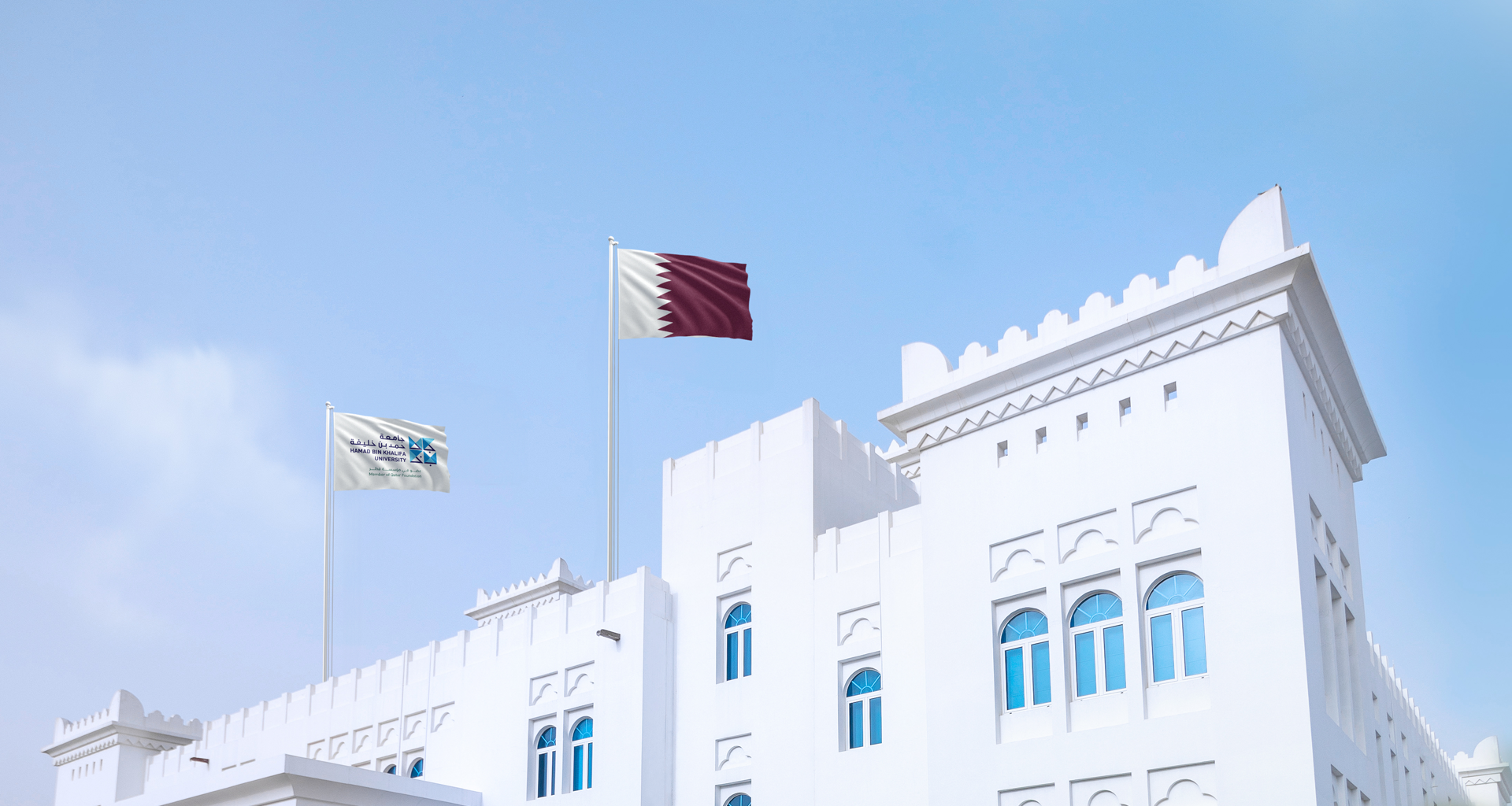
QF’s Hamad Bin Khalifa University to Offer Undergraduate Engineering Programs in Education City

HBKU’s CSE and IE Impact Xcelerator Host Healthcare and Technology Collider Roundtable

HBKU’s CSE Hosts 14th International Conference on Hydrogen Production (ICH2P-2023)

HBKU’s College of Science and Engineering Organizes First Industry and Government Advisory Board Meeting

HBKU and Quantum.Tech Bring Major Quantum Event to the Middle East for the First Time

HBKU Signs Memorandum of Understanding with Canada’s Leading Innovation Organization

Hamad Bin Khalifa University and Quantinuum Partner to Advance Quantum Computing in Qatar

HBKU’s College of Science and Engineering Signs Memorandum of Understanding with NASA on Quantum Research and Education

Q-CTRL and Hamad Bin Khalifa University’s College of Science and Engineering Partner to Equip the Next Generation Quantum Workforce in Qatar

QF’s Hamad Bin Khalifa University to Offer Undergraduate Engineering Programs in Education City

HBKU’s CSE and IE Impact Xcelerator Host Healthcare and Technology Collider Roundtable

HBKU’s CSE Hosts 14th International Conference on Hydrogen Production (ICH2P-2023)

HBKU’s College of Science and Engineering Organizes First Industry and Government Advisory Board Meeting

HBKU and Quantum.Tech Bring Major Quantum Event to the Middle East for the First Time

HBKU Signs Memorandum of Understanding with Canada’s Leading Innovation Organization

Hamad Bin Khalifa University and Quantinuum Partner to Advance Quantum Computing in Qatar

HBKU’s College of Science and Engineering Signs Memorandum of Understanding with NASA on Quantum Research and Education

Q-CTRL and Hamad Bin Khalifa University’s College of Science and Engineering Partner to Equip the Next Generation Quantum Workforce in Qatar

QF’s Hamad Bin Khalifa University to Offer Undergraduate Engineering Programs in Education City

HBKU’s CSE and IE Impact Xcelerator Host Healthcare and Technology Collider Roundtable

HBKU’s CSE Hosts 14th International Conference on Hydrogen Production (ICH2P-2023)

HBKU’s College of Science and Engineering Organizes First Industry and Government Advisory Board Meeting

HBKU and Quantum.Tech Bring Major Quantum Event to the Middle East for the First Time

HBKU Signs Memorandum of Understanding with Canada’s Leading Innovation Organization

Hamad Bin Khalifa University and Quantinuum Partner to Advance Quantum Computing in Qatar

HBKU’s College of Science and Engineering Signs Memorandum of Understanding with NASA on Quantum Research and Education

Q-CTRL and Hamad Bin Khalifa University’s College of Science and Engineering Partner to Equip the Next Generation Quantum Workforce in Qatar

QF’s Hamad Bin Khalifa University to Offer Undergraduate Engineering Programs in Education City

HBKU’s CSE and IE Impact Xcelerator Host Healthcare and Technology Collider Roundtable

HBKU’s CSE Hosts 14th International Conference on Hydrogen Production (ICH2P-2023)

HBKU’s College of Science and Engineering Organizes First Industry and Government Advisory Board Meeting

HBKU and Quantum.Tech Bring Major Quantum Event to the Middle East for the First Time

HBKU Signs Memorandum of Understanding with Canada’s Leading Innovation Organization

Hamad Bin Khalifa University and Quantinuum Partner to Advance Quantum Computing in Qatar

HBKU’s College of Science and Engineering Signs Memorandum of Understanding with NASA on Quantum Research and Education

Q-CTRL and Hamad Bin Khalifa University’s College of Science and Engineering Partner to Equip the Next Generation Quantum Workforce in Qatar

QF’s Hamad Bin Khalifa University to Offer Undergraduate Engineering Programs in Education City

HBKU’s CSE and IE Impact Xcelerator Host Healthcare and Technology Collider Roundtable

HBKU’s CSE Hosts 14th International Conference on Hydrogen Production (ICH2P-2023)

HBKU’s College of Science and Engineering Organizes First Industry and Government Advisory Board Meeting

HBKU and Quantum.Tech Bring Major Quantum Event to the Middle East for the First Time

HBKU Signs Memorandum of Understanding with Canada’s Leading Innovation Organization

Hamad Bin Khalifa University and Quantinuum Partner to Advance Quantum Computing in Qatar

HBKU’s College of Science and Engineering Signs Memorandum of Understanding with NASA on Quantum Research and Education

Q-CTRL and Hamad Bin Khalifa University’s College of Science and Engineering Partner to Equip the Next Generation Quantum Workforce in Qatar

QF’s Hamad Bin Khalifa University to Offer Undergraduate Engineering Programs in Education City

HBKU’s CSE and IE Impact Xcelerator Host Healthcare and Technology Collider Roundtable

HBKU’s CSE Hosts 14th International Conference on Hydrogen Production (ICH2P-2023)

HBKU’s College of Science and Engineering Organizes First Industry and Government Advisory Board Meeting

HBKU and Quantum.Tech Bring Major Quantum Event to the Middle East for the First Time

HBKU Signs Memorandum of Understanding with Canada’s Leading Innovation Organization

Hamad Bin Khalifa University and Quantinuum Partner to Advance Quantum Computing in Qatar

HBKU’s College of Science and Engineering Signs Memorandum of Understanding with NASA on Quantum Research and Education

Q-CTRL and Hamad Bin Khalifa University’s College of Science and Engineering Partner to Equip the Next Generation Quantum Workforce in Qatar

QF’s Hamad Bin Khalifa University to Offer Undergraduate Engineering Programs in Education City

HBKU’s CSE and IE Impact Xcelerator Host Healthcare and Technology Collider Roundtable

HBKU’s CSE Hosts 14th International Conference on Hydrogen Production (ICH2P-2023)

HBKU’s College of Science and Engineering Organizes First Industry and Government Advisory Board Meeting

HBKU and Quantum.Tech Bring Major Quantum Event to the Middle East for the First Time

HBKU Signs Memorandum of Understanding with Canada’s Leading Innovation Organization

Hamad Bin Khalifa University and Quantinuum Partner to Advance Quantum Computing in Qatar

HBKU’s College of Science and Engineering Signs Memorandum of Understanding with NASA on Quantum Research and Education

Q-CTRL and Hamad Bin Khalifa University’s College of Science and Engineering Partner to Equip the Next Generation Quantum Workforce in Qatar

QF’s Hamad Bin Khalifa University to Offer Undergraduate Engineering Programs in Education City

HBKU’s CSE and IE Impact Xcelerator Host Healthcare and Technology Collider Roundtable

HBKU’s CSE Hosts 14th International Conference on Hydrogen Production (ICH2P-2023)

HBKU’s College of Science and Engineering Organizes First Industry and Government Advisory Board Meeting

HBKU and Quantum.Tech Bring Major Quantum Event to the Middle East for the First Time

HBKU Signs Memorandum of Understanding with Canada’s Leading Innovation Organization

Hamad Bin Khalifa University and Quantinuum Partner to Advance Quantum Computing in Qatar

HBKU’s College of Science and Engineering Signs Memorandum of Understanding with NASA on Quantum Research and Education

Q-CTRL and Hamad Bin Khalifa University’s College of Science and Engineering Partner to Equip the Next Generation Quantum Workforce in Qatar

QF’s Hamad Bin Khalifa University to Offer Undergraduate Engineering Programs in Education City

HBKU’s CSE and IE Impact Xcelerator Host Healthcare and Technology Collider Roundtable

HBKU’s CSE Hosts 14th International Conference on Hydrogen Production (ICH2P-2023)

HBKU’s College of Science and Engineering Organizes First Industry and Government Advisory Board Meeting

HBKU and Quantum.Tech Bring Major Quantum Event to the Middle East for the First Time

HBKU Signs Memorandum of Understanding with Canada’s Leading Innovation Organization

Hamad Bin Khalifa University and Quantinuum Partner to Advance Quantum Computing in Qatar

HBKU’s College of Science and Engineering Signs Memorandum of Understanding with NASA on Quantum Research and Education

Q-CTRL and Hamad Bin Khalifa University’s College of Science and Engineering Partner to Equip the Next Generation Quantum Workforce in Qatar

QF’s Hamad Bin Khalifa University to Offer Undergraduate Engineering Programs in Education City

HBKU’s CSE and IE Impact Xcelerator Host Healthcare and Technology Collider Roundtable

HBKU’s CSE Hosts 14th International Conference on Hydrogen Production (ICH2P-2023)

HBKU’s College of Science and Engineering Organizes First Industry and Government Advisory Board Meeting

HBKU and Quantum.Tech Bring Major Quantum Event to the Middle East for the First Time

HBKU Signs Memorandum of Understanding with Canada’s Leading Innovation Organization

Hamad Bin Khalifa University and Quantinuum Partner to Advance Quantum Computing in Qatar

HBKU’s College of Science and Engineering Signs Memorandum of Understanding with NASA on Quantum Research and Education

Q-CTRL and Hamad Bin Khalifa University’s College of Science and Engineering Partner to Equip the Next Generation Quantum Workforce in Qatar

QF’s Hamad Bin Khalifa University to Offer Undergraduate Engineering Programs in Education City

HBKU’s CSE and IE Impact Xcelerator Host Healthcare and Technology Collider Roundtable

HBKU’s CSE Hosts 14th International Conference on Hydrogen Production (ICH2P-2023)

HBKU’s College of Science and Engineering Organizes First Industry and Government Advisory Board Meeting

HBKU and Quantum.Tech Bring Major Quantum Event to the Middle East for the First Time

HBKU Signs Memorandum of Understanding with Canada’s Leading Innovation Organization

Hamad Bin Khalifa University and Quantinuum Partner to Advance Quantum Computing in Qatar

HBKU’s College of Science and Engineering Signs Memorandum of Understanding with NASA on Quantum Research and Education

Q-CTRL and Hamad Bin Khalifa University’s College of Science and Engineering Partner to Equip the Next Generation Quantum Workforce in Qatar

QF’s Hamad Bin Khalifa University to Offer Undergraduate Engineering Programs in Education City

HBKU’s CSE and IE Impact Xcelerator Host Healthcare and Technology Collider Roundtable

HBKU’s CSE Hosts 14th International Conference on Hydrogen Production (ICH2P-2023)

HBKU’s College of Science and Engineering Organizes First Industry and Government Advisory Board Meeting

HBKU and Quantum.Tech Bring Major Quantum Event to the Middle East for the First Time

HBKU Signs Memorandum of Understanding with Canada’s Leading Innovation Organization

Hamad Bin Khalifa University and Quantinuum Partner to Advance Quantum Computing in Qatar

HBKU’s College of Science and Engineering Signs Memorandum of Understanding with NASA on Quantum Research and Education

Q-CTRL and Hamad Bin Khalifa University’s College of Science and Engineering Partner to Equip the Next Generation Quantum Workforce in Qatar

QF’s Hamad Bin Khalifa University to Offer Undergraduate Engineering Programs in Education City

HBKU’s CSE and IE Impact Xcelerator Host Healthcare and Technology Collider Roundtable

HBKU’s CSE Hosts 14th International Conference on Hydrogen Production (ICH2P-2023)

HBKU’s College of Science and Engineering Organizes First Industry and Government Advisory Board Meeting

HBKU and Quantum.Tech Bring Major Quantum Event to the Middle East for the First Time

HBKU Signs Memorandum of Understanding with Canada’s Leading Innovation Organization

Hamad Bin Khalifa University and Quantinuum Partner to Advance Quantum Computing in Qatar

HBKU’s College of Science and Engineering Signs Memorandum of Understanding with NASA on Quantum Research and Education

Q-CTRL and Hamad Bin Khalifa University’s College of Science and Engineering Partner to Equip the Next Generation Quantum Workforce in Qatar

QF’s Hamad Bin Khalifa University to Offer Undergraduate Engineering Programs in Education City

HBKU’s CSE and IE Impact Xcelerator Host Healthcare and Technology Collider Roundtable

HBKU’s CSE Hosts 14th International Conference on Hydrogen Production (ICH2P-2023)

HBKU’s College of Science and Engineering Organizes First Industry and Government Advisory Board Meeting

HBKU and Quantum.Tech Bring Major Quantum Event to the Middle East for the First Time

HBKU Signs Memorandum of Understanding with Canada’s Leading Innovation Organization

Hamad Bin Khalifa University and Quantinuum Partner to Advance Quantum Computing in Qatar

HBKU’s College of Science and Engineering Signs Memorandum of Understanding with NASA on Quantum Research and Education

Q-CTRL and Hamad Bin Khalifa University’s College of Science and Engineering Partner to Equip the Next Generation Quantum Workforce in Qatar

QF’s Hamad Bin Khalifa University to Offer Undergraduate Engineering Programs in Education City

HBKU’s CSE and IE Impact Xcelerator Host Healthcare and Technology Collider Roundtable

HBKU’s CSE Hosts 14th International Conference on Hydrogen Production (ICH2P-2023)

HBKU’s College of Science and Engineering Organizes First Industry and Government Advisory Board Meeting

HBKU and Quantum.Tech Bring Major Quantum Event to the Middle East for the First Time

HBKU Signs Memorandum of Understanding with Canada’s Leading Innovation Organization

Hamad Bin Khalifa University and Quantinuum Partner to Advance Quantum Computing in Qatar

HBKU’s College of Science and Engineering Signs Memorandum of Understanding with NASA on Quantum Research and Education

Q-CTRL and Hamad Bin Khalifa University’s College of Science and Engineering Partner to Equip the Next Generation Quantum Workforce in Qatar

QF’s Hamad Bin Khalifa University to Offer Undergraduate Engineering Programs in Education City

HBKU’s CSE and IE Impact Xcelerator Host Healthcare and Technology Collider Roundtable

HBKU’s CSE Hosts 14th International Conference on Hydrogen Production (ICH2P-2023)

HBKU’s College of Science and Engineering Organizes First Industry and Government Advisory Board Meeting

HBKU and Quantum.Tech Bring Major Quantum Event to the Middle East for the First Time

HBKU Signs Memorandum of Understanding with Canada’s Leading Innovation Organization

Hamad Bin Khalifa University and Quantinuum Partner to Advance Quantum Computing in Qatar

HBKU’s College of Science and Engineering Signs Memorandum of Understanding with NASA on Quantum Research and Education

Q-CTRL and Hamad Bin Khalifa University’s College of Science and Engineering Partner to Equip the Next Generation Quantum Workforce in Qatar

QF’s Hamad Bin Khalifa University to Offer Undergraduate Engineering Programs in Education City

HBKU’s CSE and IE Impact Xcelerator Host Healthcare and Technology Collider Roundtable

HBKU’s CSE Hosts 14th International Conference on Hydrogen Production (ICH2P-2023)

HBKU’s College of Science and Engineering Organizes First Industry and Government Advisory Board Meeting

HBKU and Quantum.Tech Bring Major Quantum Event to the Middle East for the First Time

HBKU Signs Memorandum of Understanding with Canada’s Leading Innovation Organization

Hamad Bin Khalifa University and Quantinuum Partner to Advance Quantum Computing in Qatar

HBKU’s College of Science and Engineering Signs Memorandum of Understanding with NASA on Quantum Research and Education

Q-CTRL and Hamad Bin Khalifa University’s College of Science and Engineering Partner to Equip the Next Generation Quantum Workforce in Qatar

QF’s Hamad Bin Khalifa University to Offer Undergraduate Engineering Programs in Education City

HBKU’s CSE and IE Impact Xcelerator Host Healthcare and Technology Collider Roundtable

HBKU’s CSE Hosts 14th International Conference on Hydrogen Production (ICH2P-2023)

HBKU’s College of Science and Engineering Organizes First Industry and Government Advisory Board Meeting

HBKU and Quantum.Tech Bring Major Quantum Event to the Middle East for the First Time

HBKU Signs Memorandum of Understanding with Canada’s Leading Innovation Organization

Hamad Bin Khalifa University and Quantinuum Partner to Advance Quantum Computing in Qatar

HBKU’s College of Science and Engineering Signs Memorandum of Understanding with NASA on Quantum Research and Education

Q-CTRL and Hamad Bin Khalifa University’s College of Science and Engineering Partner to Equip the Next Generation Quantum Workforce in Qatar

QF’s Hamad Bin Khalifa University to Offer Undergraduate Engineering Programs in Education City

HBKU’s CSE and IE Impact Xcelerator Host Healthcare and Technology Collider Roundtable

HBKU’s CSE Hosts 14th International Conference on Hydrogen Production (ICH2P-2023)

HBKU’s College of Science and Engineering Organizes First Industry and Government Advisory Board Meeting

HBKU and Quantum.Tech Bring Major Quantum Event to the Middle East for the First Time

HBKU Signs Memorandum of Understanding with Canada’s Leading Innovation Organization

Hamad Bin Khalifa University and Quantinuum Partner to Advance Quantum Computing in Qatar

HBKU’s College of Science and Engineering Signs Memorandum of Understanding with NASA on Quantum Research and Education

Q-CTRL and Hamad Bin Khalifa University’s College of Science and Engineering Partner to Equip the Next Generation Quantum Workforce in Qatar

QF’s Hamad Bin Khalifa University to Offer Undergraduate Engineering Programs in Education City

HBKU’s CSE and IE Impact Xcelerator Host Healthcare and Technology Collider Roundtable

HBKU’s CSE Hosts 14th International Conference on Hydrogen Production (ICH2P-2023)

HBKU’s College of Science and Engineering Organizes First Industry and Government Advisory Board Meeting

HBKU and Quantum.Tech Bring Major Quantum Event to the Middle East for the First Time

HBKU Signs Memorandum of Understanding with Canada’s Leading Innovation Organization

Hamad Bin Khalifa University and Quantinuum Partner to Advance Quantum Computing in Qatar

HBKU’s College of Science and Engineering Signs Memorandum of Understanding with NASA on Quantum Research and Education

Q-CTRL and Hamad Bin Khalifa University’s College of Science and Engineering Partner to Equip the Next Generation Quantum Workforce in Qatar

QF’s Hamad Bin Khalifa University to Offer Undergraduate Engineering Programs in Education City

HBKU’s CSE and IE Impact Xcelerator Host Healthcare and Technology Collider Roundtable

HBKU’s CSE Hosts 14th International Conference on Hydrogen Production (ICH2P-2023)

HBKU’s College of Science and Engineering Organizes First Industry and Government Advisory Board Meeting

HBKU and Quantum.Tech Bring Major Quantum Event to the Middle East for the First Time

HBKU Signs Memorandum of Understanding with Canada’s Leading Innovation Organization

Hamad Bin Khalifa University and Quantinuum Partner to Advance Quantum Computing in Qatar

HBKU’s College of Science and Engineering Signs Memorandum of Understanding with NASA on Quantum Research and Education

Q-CTRL and Hamad Bin Khalifa University’s College of Science and Engineering Partner to Equip the Next Generation Quantum Workforce in Qatar

QF’s Hamad Bin Khalifa University to Offer Undergraduate Engineering Programs in Education City

HBKU’s CSE and IE Impact Xcelerator Host Healthcare and Technology Collider Roundtable

HBKU’s CSE Hosts 14th International Conference on Hydrogen Production (ICH2P-2023)

HBKU’s College of Science and Engineering Organizes First Industry and Government Advisory Board Meeting

HBKU and Quantum.Tech Bring Major Quantum Event to the Middle East for the First Time

HBKU Signs Memorandum of Understanding with Canada’s Leading Innovation Organization

Hamad Bin Khalifa University and Quantinuum Partner to Advance Quantum Computing in Qatar

HBKU’s College of Science and Engineering Signs Memorandum of Understanding with NASA on Quantum Research and Education

Q-CTRL and Hamad Bin Khalifa University’s College of Science and Engineering Partner to Equip the Next Generation Quantum Workforce in Qatar

QF’s Hamad Bin Khalifa University to Offer Undergraduate Engineering Programs in Education City

HBKU’s CSE and IE Impact Xcelerator Host Healthcare and Technology Collider Roundtable

HBKU’s CSE Hosts 14th International Conference on Hydrogen Production (ICH2P-2023)

HBKU’s College of Science and Engineering Organizes First Industry and Government Advisory Board Meeting

HBKU and Quantum.Tech Bring Major Quantum Event to the Middle East for the First Time

HBKU Signs Memorandum of Understanding with Canada’s Leading Innovation Organization

Hamad Bin Khalifa University and Quantinuum Partner to Advance Quantum Computing in Qatar

HBKU’s College of Science and Engineering Signs Memorandum of Understanding with NASA on Quantum Research and Education

Q-CTRL and Hamad Bin Khalifa University’s College of Science and Engineering Partner to Equip the Next Generation Quantum Workforce in Qatar

QF’s Hamad Bin Khalifa University to Offer Undergraduate Engineering Programs in Education City

HBKU’s CSE and IE Impact Xcelerator Host Healthcare and Technology Collider Roundtable

HBKU’s CSE Hosts 14th International Conference on Hydrogen Production (ICH2P-2023)

HBKU’s College of Science and Engineering Organizes First Industry and Government Advisory Board Meeting

HBKU and Quantum.Tech Bring Major Quantum Event to the Middle East for the First Time

HBKU Signs Memorandum of Understanding with Canada’s Leading Innovation Organization

Hamad Bin Khalifa University and Quantinuum Partner to Advance Quantum Computing in Qatar

HBKU’s College of Science and Engineering Signs Memorandum of Understanding with NASA on Quantum Research and Education

Q-CTRL and Hamad Bin Khalifa University’s College of Science and Engineering Partner to Equip the Next Generation Quantum Workforce in Qatar

QF’s Hamad Bin Khalifa University to Offer Undergraduate Engineering Programs in Education City

HBKU’s CSE and IE Impact Xcelerator Host Healthcare and Technology Collider Roundtable

HBKU’s CSE Hosts 14th International Conference on Hydrogen Production (ICH2P-2023)

HBKU’s College of Science and Engineering Organizes First Industry and Government Advisory Board Meeting

HBKU and Quantum.Tech Bring Major Quantum Event to the Middle East for the First Time

HBKU Signs Memorandum of Understanding with Canada’s Leading Innovation Organization

Hamad Bin Khalifa University and Quantinuum Partner to Advance Quantum Computing in Qatar

HBKU’s College of Science and Engineering Signs Memorandum of Understanding with NASA on Quantum Research and Education

Q-CTRL and Hamad Bin Khalifa University’s College of Science and Engineering Partner to Equip the Next Generation Quantum Workforce in Qatar

QF’s Hamad Bin Khalifa University to Offer Undergraduate Engineering Programs in Education City

HBKU’s CSE and IE Impact Xcelerator Host Healthcare and Technology Collider Roundtable

HBKU’s CSE Hosts 14th International Conference on Hydrogen Production (ICH2P-2023)

HBKU’s College of Science and Engineering Organizes First Industry and Government Advisory Board Meeting

HBKU and Quantum.Tech Bring Major Quantum Event to the Middle East for the First Time

HBKU Signs Memorandum of Understanding with Canada’s Leading Innovation Organization

Hamad Bin Khalifa University and Quantinuum Partner to Advance Quantum Computing in Qatar

HBKU’s College of Science and Engineering Signs Memorandum of Understanding with NASA on Quantum Research and Education

Q-CTRL and Hamad Bin Khalifa University’s College of Science and Engineering Partner to Equip the Next Generation Quantum Workforce in Qatar

QF’s Hamad Bin Khalifa University to Offer Undergraduate Engineering Programs in Education City

HBKU’s CSE and IE Impact Xcelerator Host Healthcare and Technology Collider Roundtable

HBKU’s CSE Hosts 14th International Conference on Hydrogen Production (ICH2P-2023)

HBKU’s College of Science and Engineering Organizes First Industry and Government Advisory Board Meeting

HBKU and Quantum.Tech Bring Major Quantum Event to the Middle East for the First Time

HBKU Signs Memorandum of Understanding with Canada’s Leading Innovation Organization

Hamad Bin Khalifa University and Quantinuum Partner to Advance Quantum Computing in Qatar

HBKU’s College of Science and Engineering Signs Memorandum of Understanding with NASA on Quantum Research and Education

Q-CTRL and Hamad Bin Khalifa University’s College of Science and Engineering Partner to Equip the Next Generation Quantum Workforce in Qatar

QF’s Hamad Bin Khalifa University to Offer Undergraduate Engineering Programs in Education City

HBKU’s CSE and IE Impact Xcelerator Host Healthcare and Technology Collider Roundtable

HBKU’s CSE Hosts 14th International Conference on Hydrogen Production (ICH2P-2023)

HBKU’s College of Science and Engineering Organizes First Industry and Government Advisory Board Meeting

HBKU and Quantum.Tech Bring Major Quantum Event to the Middle East for the First Time

HBKU Signs Memorandum of Understanding with Canada’s Leading Innovation Organization

Hamad Bin Khalifa University and Quantinuum Partner to Advance Quantum Computing in Qatar

HBKU’s College of Science and Engineering Signs Memorandum of Understanding with NASA on Quantum Research and Education

Q-CTRL and Hamad Bin Khalifa University’s College of Science and Engineering Partner to Equip the Next Generation Quantum Workforce in Qatar

QF’s Hamad Bin Khalifa University to Offer Undergraduate Engineering Programs in Education City

HBKU’s CSE and IE Impact Xcelerator Host Healthcare and Technology Collider Roundtable

HBKU’s CSE Hosts 14th International Conference on Hydrogen Production (ICH2P-2023)

HBKU’s College of Science and Engineering Organizes First Industry and Government Advisory Board Meeting

HBKU and Quantum.Tech Bring Major Quantum Event to the Middle East for the First Time

HBKU Signs Memorandum of Understanding with Canada’s Leading Innovation Organization

Hamad Bin Khalifa University and Quantinuum Partner to Advance Quantum Computing in Qatar

HBKU’s College of Science and Engineering Signs Memorandum of Understanding with NASA on Quantum Research and Education

Q-CTRL and Hamad Bin Khalifa University’s College of Science and Engineering Partner to Equip the Next Generation Quantum Workforce in Qatar

QF’s Hamad Bin Khalifa University to Offer Undergraduate Engineering Programs in Education City

HBKU’s CSE and IE Impact Xcelerator Host Healthcare and Technology Collider Roundtable

HBKU’s CSE Hosts 14th International Conference on Hydrogen Production (ICH2P-2023)

HBKU’s College of Science and Engineering Organizes First Industry and Government Advisory Board Meeting

HBKU and Quantum.Tech Bring Major Quantum Event to the Middle East for the First Time

HBKU Signs Memorandum of Understanding with Canada’s Leading Innovation Organization

Hamad Bin Khalifa University and Quantinuum Partner to Advance Quantum Computing in Qatar

HBKU’s College of Science and Engineering Signs Memorandum of Understanding with NASA on Quantum Research and Education

Q-CTRL and Hamad Bin Khalifa University’s College of Science and Engineering Partner to Equip the Next Generation Quantum Workforce in Qatar

QF’s Hamad Bin Khalifa University to Offer Undergraduate Engineering Programs in Education City

HBKU’s CSE and IE Impact Xcelerator Host Healthcare and Technology Collider Roundtable

HBKU’s CSE Hosts 14th International Conference on Hydrogen Production (ICH2P-2023)

HBKU’s College of Science and Engineering Organizes First Industry and Government Advisory Board Meeting

HBKU and Quantum.Tech Bring Major Quantum Event to the Middle East for the First Time

HBKU Signs Memorandum of Understanding with Canada’s Leading Innovation Organization

Hamad Bin Khalifa University and Quantinuum Partner to Advance Quantum Computing in Qatar

HBKU’s College of Science and Engineering Signs Memorandum of Understanding with NASA on Quantum Research and Education

Q-CTRL and Hamad Bin Khalifa University’s College of Science and Engineering Partner to Equip the Next Generation Quantum Workforce in Qatar

QF’s Hamad Bin Khalifa University to Offer Undergraduate Engineering Programs in Education City

HBKU’s CSE and IE Impact Xcelerator Host Healthcare and Technology Collider Roundtable

HBKU’s CSE Hosts 14th International Conference on Hydrogen Production (ICH2P-2023)

HBKU’s College of Science and Engineering Organizes First Industry and Government Advisory Board Meeting

HBKU and Quantum.Tech Bring Major Quantum Event to the Middle East for the First Time

HBKU Signs Memorandum of Understanding with Canada’s Leading Innovation Organization

Hamad Bin Khalifa University and Quantinuum Partner to Advance Quantum Computing in Qatar

HBKU’s College of Science and Engineering Signs Memorandum of Understanding with NASA on Quantum Research and Education

Q-CTRL and Hamad Bin Khalifa University’s College of Science and Engineering Partner to Equip the Next Generation Quantum Workforce in Qatar

QF’s Hamad Bin Khalifa University to Offer Undergraduate Engineering Programs in Education City

HBKU’s CSE and IE Impact Xcelerator Host Healthcare and Technology Collider Roundtable

HBKU’s CSE Hosts 14th International Conference on Hydrogen Production (ICH2P-2023)

HBKU’s College of Science and Engineering Organizes First Industry and Government Advisory Board Meeting

HBKU and Quantum.Tech Bring Major Quantum Event to the Middle East for the First Time

HBKU Signs Memorandum of Understanding with Canada’s Leading Innovation Organization

Hamad Bin Khalifa University and Quantinuum Partner to Advance Quantum Computing in Qatar

HBKU’s College of Science and Engineering Signs Memorandum of Understanding with NASA on Quantum Research and Education

Q-CTRL and Hamad Bin Khalifa University’s College of Science and Engineering Partner to Equip the Next Generation Quantum Workforce in Qatar

QF’s Hamad Bin Khalifa University to Offer Undergraduate Engineering Programs in Education City

HBKU’s CSE and IE Impact Xcelerator Host Healthcare and Technology Collider Roundtable

HBKU’s CSE Hosts 14th International Conference on Hydrogen Production (ICH2P-2023)

HBKU’s College of Science and Engineering Organizes First Industry and Government Advisory Board Meeting

HBKU and Quantum.Tech Bring Major Quantum Event to the Middle East for the First Time

HBKU Signs Memorandum of Understanding with Canada’s Leading Innovation Organization

Hamad Bin Khalifa University and Quantinuum Partner to Advance Quantum Computing in Qatar

HBKU’s College of Science and Engineering Signs Memorandum of Understanding with NASA on Quantum Research and Education

Q-CTRL and Hamad Bin Khalifa University’s College of Science and Engineering Partner to Equip the Next Generation Quantum Workforce in Qatar

QF’s Hamad Bin Khalifa University to Offer Undergraduate Engineering Programs in Education City

HBKU’s CSE and IE Impact Xcelerator Host Healthcare and Technology Collider Roundtable

HBKU’s CSE Hosts 14th International Conference on Hydrogen Production (ICH2P-2023)

HBKU’s College of Science and Engineering Organizes First Industry and Government Advisory Board Meeting

HBKU and Quantum.Tech Bring Major Quantum Event to the Middle East for the First Time

HBKU Signs Memorandum of Understanding with Canada’s Leading Innovation Organization

Hamad Bin Khalifa University and Quantinuum Partner to Advance Quantum Computing in Qatar

HBKU’s College of Science and Engineering Signs Memorandum of Understanding with NASA on Quantum Research and Education

Q-CTRL and Hamad Bin Khalifa University’s College of Science and Engineering Partner to Equip the Next Generation Quantum Workforce in Qatar

QF’s Hamad Bin Khalifa University to Offer Undergraduate Engineering Programs in Education City

HBKU’s CSE and IE Impact Xcelerator Host Healthcare and Technology Collider Roundtable

HBKU’s CSE Hosts 14th International Conference on Hydrogen Production (ICH2P-2023)

HBKU’s College of Science and Engineering Organizes First Industry and Government Advisory Board Meeting

HBKU and Quantum.Tech Bring Major Quantum Event to the Middle East for the First Time

HBKU Signs Memorandum of Understanding with Canada’s Leading Innovation Organization

Hamad Bin Khalifa University and Quantinuum Partner to Advance Quantum Computing in Qatar

HBKU’s College of Science and Engineering Signs Memorandum of Understanding with NASA on Quantum Research and Education

Q-CTRL and Hamad Bin Khalifa University’s College of Science and Engineering Partner to Equip the Next Generation Quantum Workforce in Qatar

QF’s Hamad Bin Khalifa University to Offer Undergraduate Engineering Programs in Education City

HBKU’s CSE and IE Impact Xcelerator Host Healthcare and Technology Collider Roundtable

HBKU’s CSE Hosts 14th International Conference on Hydrogen Production (ICH2P-2023)

HBKU’s College of Science and Engineering Organizes First Industry and Government Advisory Board Meeting

HBKU and Quantum.Tech Bring Major Quantum Event to the Middle East for the First Time

HBKU Signs Memorandum of Understanding with Canada’s Leading Innovation Organization

Hamad Bin Khalifa University and Quantinuum Partner to Advance Quantum Computing in Qatar

HBKU’s College of Science and Engineering Signs Memorandum of Understanding with NASA on Quantum Research and Education

Q-CTRL and Hamad Bin Khalifa University’s College of Science and Engineering Partner to Equip the Next Generation Quantum Workforce in Qatar

QF’s Hamad Bin Khalifa University to Offer Undergraduate Engineering Programs in Education City

HBKU’s CSE and IE Impact Xcelerator Host Healthcare and Technology Collider Roundtable

HBKU’s CSE Hosts 14th International Conference on Hydrogen Production (ICH2P-2023)

HBKU’s College of Science and Engineering Organizes First Industry and Government Advisory Board Meeting

HBKU and Quantum.Tech Bring Major Quantum Event to the Middle East for the First Time

HBKU Signs Memorandum of Understanding with Canada’s Leading Innovation Organization

Hamad Bin Khalifa University and Quantinuum Partner to Advance Quantum Computing in Qatar

HBKU’s College of Science and Engineering Signs Memorandum of Understanding with NASA on Quantum Research and Education

Q-CTRL and Hamad Bin Khalifa University’s College of Science and Engineering Partner to Equip the Next Generation Quantum Workforce in Qatar

QF’s Hamad Bin Khalifa University to Offer Undergraduate Engineering Programs in Education City

HBKU’s CSE and IE Impact Xcelerator Host Healthcare and Technology Collider Roundtable

HBKU’s CSE Hosts 14th International Conference on Hydrogen Production (ICH2P-2023)

HBKU’s College of Science and Engineering Organizes First Industry and Government Advisory Board Meeting

HBKU and Quantum.Tech Bring Major Quantum Event to the Middle East for the First Time

HBKU Signs Memorandum of Understanding with Canada’s Leading Innovation Organization

Hamad Bin Khalifa University and Quantinuum Partner to Advance Quantum Computing in Qatar

HBKU’s College of Science and Engineering Signs Memorandum of Understanding with NASA on Quantum Research and Education

Q-CTRL and Hamad Bin Khalifa University’s College of Science and Engineering Partner to Equip the Next Generation Quantum Workforce in Qatar

QF’s Hamad Bin Khalifa University to Offer Undergraduate Engineering Programs in Education City

HBKU’s CSE and IE Impact Xcelerator Host Healthcare and Technology Collider Roundtable






